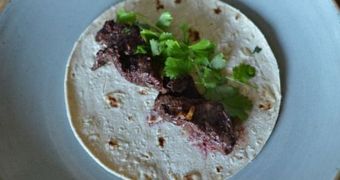A British man has decided to try some new and eccentric types of food after his wife gave birth to their first child. So far, so bland, but there is something more to the story, as he included an unusual ingredient in his new creations: his wife's placenta.
Nicholas Baines from Bournemouth asked to keep the placenta after his wife gave birth, so he left the hospital with the woman, their newborn son and a doggy bag with “a few cheeky steaks of placenta,” as he says in a piece documenting the experience published by The Guardian.
Led by an inquisitive appetite, he then ate it blended in a smoothie and fried up in a taco shell, spiced up with garlic and paprika.
The journalist motivated his decision to indulge in placentophagy, the act of eating the placenta, by saying that he wanted to find out how it would taste.
Baines admitted he got a bit nervous at the hospital after seeing “the wobbly, knotted mass of fibrous, clot-like flesh” but still went home with the organ.
He looked online for recipes including the unusual ingredient and was surprised to find out that there were quite a few. He decided on a placenta smoothie after seeing that many mothers praised the recipe on Twitter, and a taco.
After consuming the meat-filled food, Nick concluded that the drink “looked rank,” despite being blended with coconut water and banana for 10 minutes. But the cooked placenta was a pleasant surprise for him.
“As I seasoned it on the chopping board, the bright, almost glowing red chunk of placenta was more attractive than many cuts of offal I've dealt with, and looked quite appetising,” he said. “The meat was rich, with a beef-like quality. It was tender, kind of like roast brisket and not dissimilar to Texas BBQ.”
Nick Baines is known to the world of journalism as a food and travel writer and has worked for several print and online publications, including The Times and The Guardian.
Placentophagy, the act of eating the placenta after a baby is born, has been growing in popularity in recent years for its apparent health benefits. Those who advocate placentophagy in humans believe that eating the placenta prevents postpartum depression and other pregnancy complications.
However, there are many who consider the practice unhealthy. Dr. Rohan Lewis, a reader of physiology at the University of Southampton, for instance, says that “Though it is a rich source of protein, it is designed to feed the baby, not the mother. If you do decide to eat placenta, it's probably best to eat your own, rather than other people's.”

 14 DAY TRIAL //
14 DAY TRIAL //